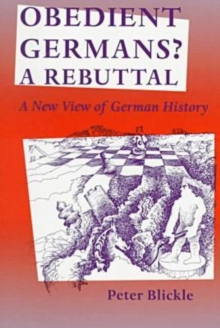
Evil People : A Comparative Study of Witch Hunts in Swabian Austria and the Electorate of Trier Hardback
by Johannes Dillinger
Part of the Studies in Early Modern German History series
Hardback
Description
Inspired by recent efforts to understand the dynamics of the early modern witch hunt, Johannes Dillinger has produced a powerful synthesis based on careful comparisons.
Narrowing his focus to two specific regions - Swabian Austria and the Electorate of Trier - he provides a nuanced explanation of how the tensions between state power and communalism determined the course of witch hunts that claimed over 1,300 lives in sixteenth- and seventeenth-century Germany.
Dillinger finds that, far from representing the centralizing aggression of emerging early states against local cultures, witch hunts were almost always driven by members of the middle and lower classes in cities and villages, and they were stopped only when early modern states acquired the power to control their localities.
Situating his study in the context of a pervasive magical worldview that embraced both orthodox Christianity and folk belief, Dillinger shows that, in some cases, witch trials themselves were used as magical instruments, designed to avert threats of impending divine wrath. ""Evil People"" describes a two-century evolution in which witch hunters who liberally bestowed the label 'evil people' on others turned into modern images of evil themselves.
In the original German, ""Evil People"" won the Friedrich Spee Award as an outstanding contribution to the history of witchcraft.
Information
-
Out of Stock - We are unable to provide an estimated availability date for this product
- Format:Hardback
- Pages:312 pages, 9 b&w illustrations, 3 maps
- Publisher:University of Virginia Press
- Publication Date:30/08/2009
- Category:
- ISBN:9780813928067
Information
-
Out of Stock - We are unable to provide an estimated availability date for this product
- Format:Hardback
- Pages:312 pages, 9 b&w illustrations, 3 maps
- Publisher:University of Virginia Press
- Publication Date:30/08/2009
- Category:
- ISBN:9780813928067










